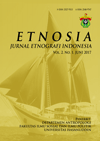Abstract
Toraja shares traditions with other ethnic groups in South Sulawesi, but Toraja has its own uniqueness, primarily related to tongkonan, which is not only as physical manifestation—House (banua) and its ‘content’ (harta tongkonan), but it is also a venue for family gathering of the tongkonan members, a house-society and a source of property. This article is focused on inheritance system among Torajanese, it examines how individual property is inherited as well as how communal property is managed and benefitted by its members. Property, for Torajanese, compose of individual property (éanan) and communal property (mana’ tongkonan) which refers to property own by members of tongkonan from one pa’rapuang—ramage traced a first ancestor who founded a Tongkonan House. While individual property can be inherited to children, communal property cannot, it can only be maintained, managed, and benefitted from among members of tongkonan, though in practice there are some violation of such norms, and any violation is always associated with their ancestor. Since tongkonan is a source of property, this may also become a source of conflict among members of tongkonan, especially for prosperous tongkonan and in terms of who is eligible to manage tongkonan and its property (to ma’kampai tongkonan). A Torajanese may become a member of more than one tongkonan because of bilateral kinship system. But, since contribution towards tongkonan (maintenance and rituals) is costly and time-consuming, one should decide in which tongkonan he/she becomes the ‘core’ or the ‘common’ member. Despite the fact that the philosophy of inheritance sharing of individual property is mabbagé rata, various grounds may be taken into account which makes a difference between siblings in a nuclear family. I argue in this article that both the right to éanan and mana’ tongkonan are related to one’s contribution in different respect.





